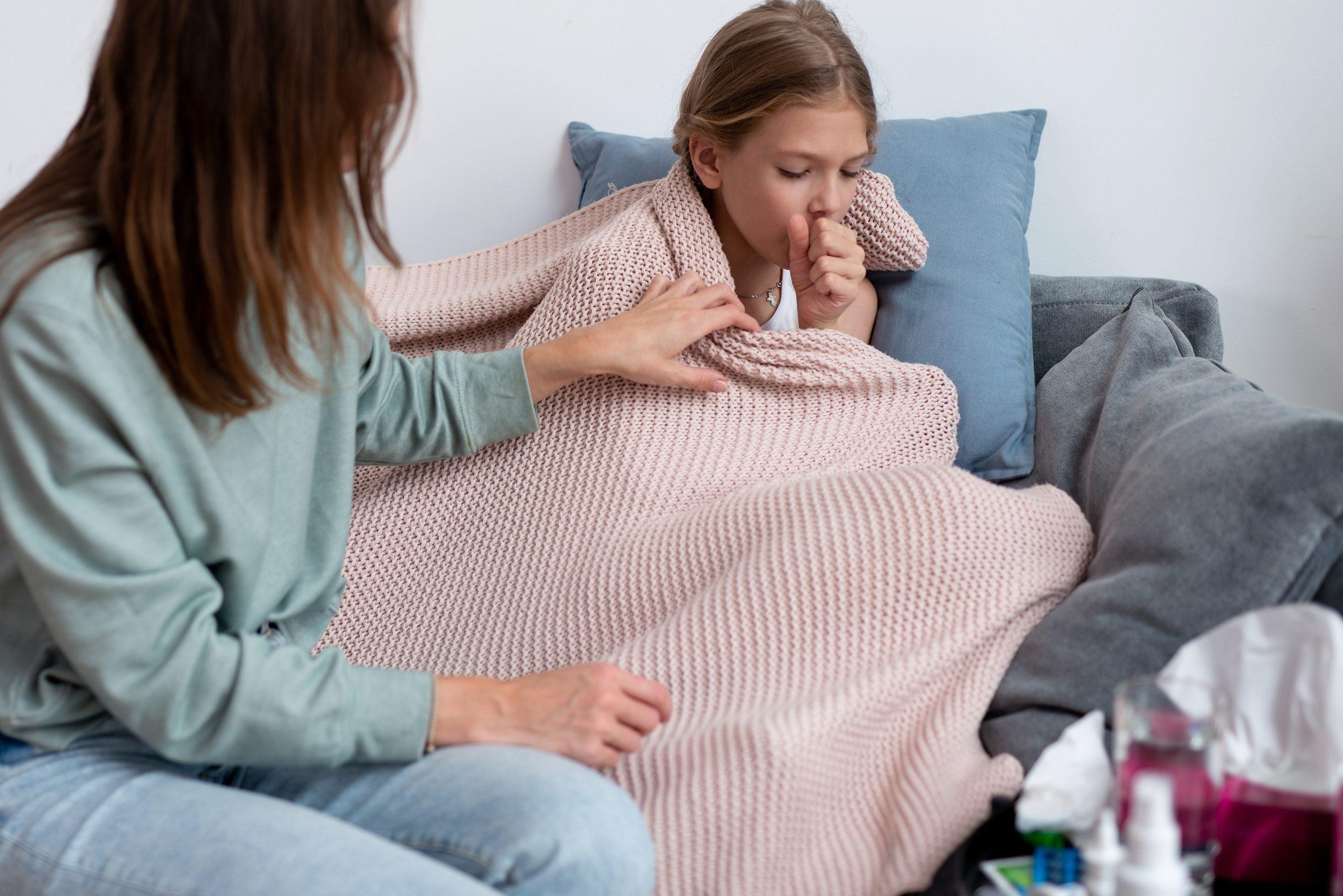This article is sponsored by Children’s Mercy
and written by Jennifer Schuster, MD, MSCI, Pediatric Infectious Diseases.

Fall is right around the corner – which means respiratory viruses are, too. Since the COVID-19 pandemic, respiratory viruses seem to circulate to new patterns, so being prepared for this fall and winter is important! According to the American Academy of Pediatrics last flu season a record number of children under the age of 4 years old were hospitalized. Here’s what you need to know to help keep your family safe and healthy.
What is the flu?
Flu, or influenza, is an infection of the nose, throat and lungs caused by the influenza virus. The flu can cause you to feel sick for at least a week. It is contagious and can be easily spread through droplets from person to person.
There’s a misconception that influenza “isn’t that bad,” but it actually can be deadly. Nothing is “just a virus.” A virus, like the flu, can make you just as sick, if not sicker, than some bacterial infections. So, be sure to take the flu seriously.
Flu symptoms include:
- Fever
- Headache, body aches, chills
- Cough
- Runny nose, congestion
- Sore throat
- Nausea, vomiting, or diarrhea
How to protect your family from the flu
The best way to protect yourself from getting the flu is to get vaccinated. Flu vaccine is safe and available and recommended for everyone 6 months and older at your doctor’s office and many places throughout your community starting in September. The flu vaccine is different from last year, so you need to be vaccinated every year for the best protection. If you have an egg allergy, you can still get the flu vaccine just talk with your doctor.
What is RSV?
RSV is a contagious virus that can be spread through droplets from coughing, sneezing or touching infected surfaces and then touching your face. The symptoms are cold-like and show up around 4 to 6 days after infection.
Symptoms include:
- Cough
- Trouble breathing
- Fever
- Runny nose and nasal congestion
For most children, RSV causes mild symptoms, and the body fights the virus off in 1-2 weeks. In young children, particularly those less than 6 months, and children with weakened immune systems, RSV can become dangerous by causing other infections like bronchiolitis and pneumonia. It is the leading cause of hospitalization among infants in the U.S, and most infants hospitalized with RSV were otherwise healthy with no chronic medical problems.
What is new with RSV in 2023?
In July 2023, the Food and Drug Administration (FDA) approved Nirsevimab (Beyfortus) to prevent RSV infections in infants. Nirsevimab is a long-acting monoclonal antibody that decreases the risk of hospitalization and severe disease from RSV in infants. It is a onetime injection that provides immunity to RSV by giving babies an antibody. It is different than a vaccine, which helps prevent disease by giving a small amount of a virus or bacteria to help a baby make antibodies with their own immune system.
In August 2023, the Centers for Disease Control and Prevention (CDC) recommended all infants younger than 8 months old, born during or entering their first RSV season, receive Nirsevimab. Only one dose is needed, but some infants may be eligible for a dose during their second year. There is currently no RSV vaccine for infants.
The Food and Drug Administration (FDA) also approved an RSV vaccine for people who are 32-36 weeks pregnant in August 2023. After getting the vaccine, the pregnant person makes antibodies to RSV and passes them to the baby before delivery. When the baby is born, they have some protection against RSV. The CDC will make recommendations, likely this fall, on who should receive this vaccine.
How to treat RSV and Flu?
For both of these viruses, you can manage fever and pain with most over-the-counter medications. If your child is having trouble breathing or staying hydrated, call your doctor or seek medical care as soon as possible.
There is no specific treatment for RSV, but there are medications to treat flu. Ask your doctor if your child needs to receive treatment for these respiratory illnesses.
How to prevent RSV and Flu
- Wash your hands for at least 20 seconds.
- Keep away from people who are sick.
- Cover your nose and mouth with a tissue when coughing or sneezing (or sneeze/cough into your elbow).
- Clean surfaces often like doorknobs, car handles, phones and keys.
- Stay at home if you are sick.
- Stay up to date with the flu vaccine.
 Children’s Mercy Wichita offers a child-friendly environment to provide families access to pediatric specialty care that otherwise might not be available without traveling out of the community including Cardiology, Endocrinology, Nephrology, Hepatology, Neurosurgery, Plastic Surgery and more.
Children’s Mercy Wichita offers a child-friendly environment to provide families access to pediatric specialty care that otherwise might not be available without traveling out of the community including Cardiology, Endocrinology, Nephrology, Hepatology, Neurosurgery, Plastic Surgery and more.
















